May 30, 2025 | 07:22 GMT +7
May 30, 2025 | 07:22 GMT +7
Hotline: 0913.378.918
May 30, 2025 | 07:22 GMT +7
Hotline: 0913.378.918
In 2008, Thai Binh Seed Group Joint Stock Company (ThaiBinh Seed) set up a linkage to produce and purchase rice seeds in Nhon Loc Commune (An Nhon Town, Thai Binh Province). Hearing that news, Mr. Pham Van Tan, Director of Nhon Tho 2 Agricultural Cooperative in An Nhon town found this linkage would bring great benefits to farmers, so he contacted the company to ask for joining it.

The average rice seed yield of Nhon Tho 2 Agricultural Cooperative is about 70 quintals/ha. Photo: Vu Dinh Thung.
Through surveys, ThaiBinh Seed found that the fields of Nhon Tho 2 Cooperative have been improved to be flat and inter-regional. Canal system there can ensure water supply for irrigations so the company had "nodded" to be a partner with it in producing rice seed.
“At the beginning, the cooperative's seed production area was very small, only a few dozen ha, able to supply ThaiBinh Seed with only a few dozen tons of rice seed. Later, the area gradually increased to hundreds of ha. By 2021, ThaiBinh Seed signed contracts with the cooperative to produce more than 200 ha of rice seed of which, nearly 136 ha were for the winter-spring crop 2020-2021," said Mr. Pham Van Tan.
For the rice seed production “machine” to work smoothly, cooperative officials had to "break up" with inertia to become more active. Since there is such a linkage in rice seed production, officials are busy from the beginning to the end of the crop.
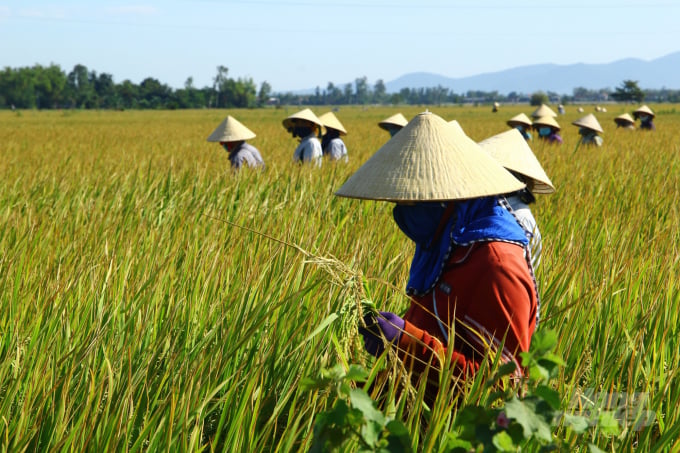
Farmers in Nhon Tho 2 Cooperative work on their rice seed fields. Photo: Vu Dinh Thung.
For fertilizing, the cooperative inform them in detail how much fertilizer is needed for the first stage. During the growth of seedlings, if pests are detected, the cooperative and the company will coordinate to provide pesticides in advance for farmers and directly instruct how to apply them on the field.
At the stage of decontamination, the cooperative will hire workers, directly work on the fields and guide farmers about the decontamination. Harvest is the busiest time of a crop. A harvesting plan has been set up earlier by the cooperative with arrangements of machines and responsibility assigned for each staff in each area to manage the harvest.
According to Mr. Tan, farmers involved in rice seeds production can be assured about input, because the cooperative has provided in advance all agricultural materials such as seedlings, fertilizers, and pesticides at low prices and with quality. Farmers only have to pay for them after harvesting and selling their new rice seeds. This has helped farmers reduce the pressure on investment capital.
“On average, the selling price of rice seed is about VND1,500-1,700/kg higher than the commercial rice, so farmers can earn a profit increase by 20-25%. By participating in rice seed production, farmers can also change their cultivation customs. They know how to apply scientific technology and mechanization to production. In the context of the complicated Covid-19 pandemic, farmers participating in this production model can sell their products quickly at high prices," said Tan.
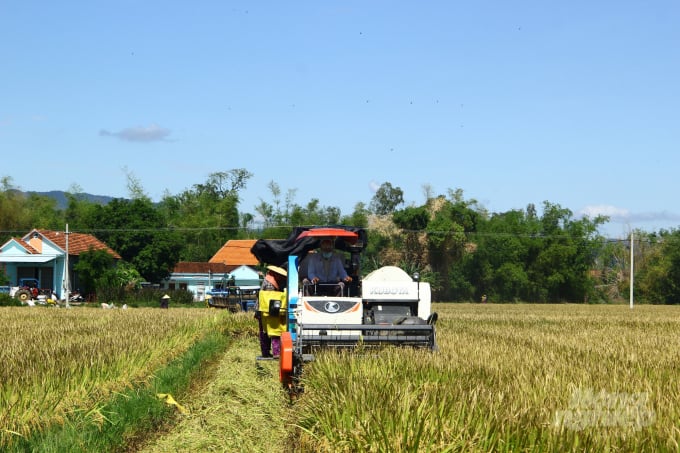
A rice seed field of Nhon Tho 2 Cooperative is being harvested. Photo: Vu Dinh Thung.
After 12 years of rice seed production linkage with ThaiBinh Seed, Nhon Tho 2 Cooperative has helped more than 500 farmer households approach sustainable production with stable income. Rice seed production has reached a high yield of over 70 quintals/ha, especially in many areas, it has reached 100 quintals/ha.
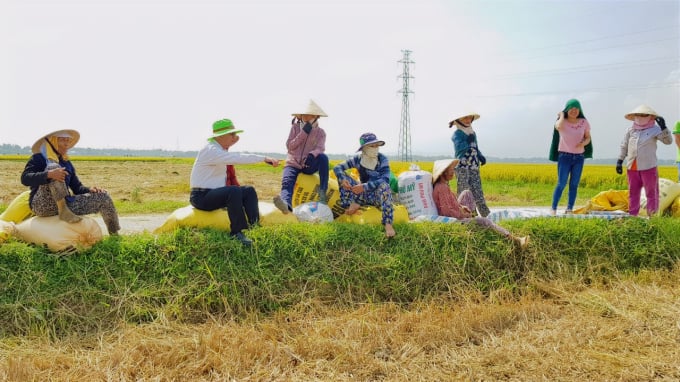
Rice seeds have been harvested on the fields of Nhon Tho 2 Cooperative. Photo: Vu Dinh Thung.
Thanks to efficient production, many farmers have got bumper harvests. They can sell up to 20 tons of rice seed after each crop at a price of 25% higher than the market price, such as Mr. Truong Thanh Van and Nguyen Van Chin in Tho Loc village 1.
According to Tan, besides economic efficiency, the production linkage model also gives farmers a lot of new knowledge in rice production. Since participating in this model, they have learned to apply new techniques such as the SRI into farming. They also become familiar with the appropriate use of seeds, fertilizers, pesticides, and irrigation to reduce input costs but increase productivity and quality.
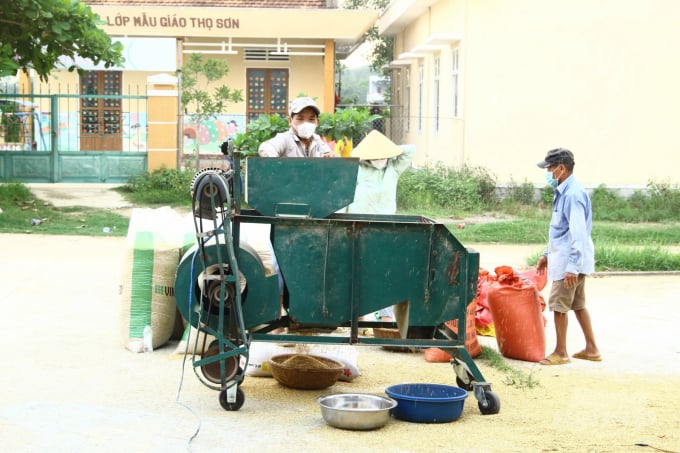
Before selling rice seeds to ThaiBinh Seed, farmers check their products carefully. Photo: Vu Dinh Thung.
“In the last autumn of 2021, ThaiBinh Seed had collected all rice seed from farmers until there was no kg left. The company has eased its purchasing rules by accepting those products with a moisture content of up to 20% which as usual, should be 13% before sales. During the Covid-19 pandemic which cause difficulties for agriculture, farmers in seed production were still not worried about consumption," said Tan.
A good news for farmers in Nhon Tho 2 Cooperative is that the linkage in production and consumption of rice seed between the Cooperative and the company is not only increasingly tightened but will also expand in the future.
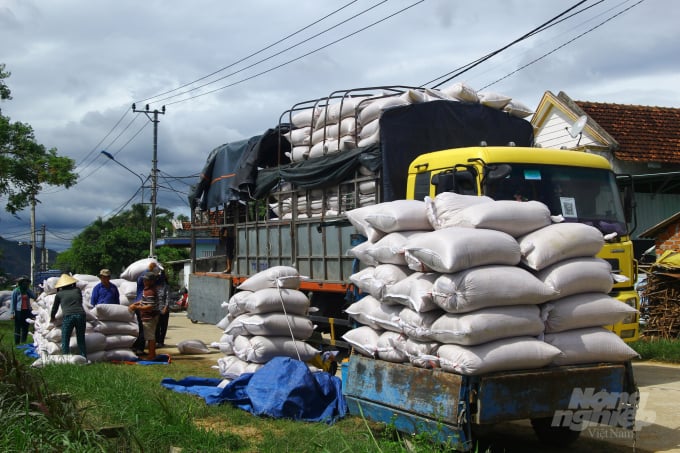
ThaiBinh Seed purchases rice seeds from Nhon Tho 2 Cooperative. Photo: Vu Dinh Thung.
“Currently, we annually produce about 1,000 ha of rice seedlings in Binh Dinh, and buy 5,000-5,500 tons of seeds. Our company is building a drying factory with an investment capital of about VND45 billion. When the drying factory is put into operation, we will buy raw rice to solve the drying problems for farmers and cooperatives.
Drying yards and drying workers are causing difficulties for farmers. At present, most of the seed production households do not have a drying yard while those of the cooperatives are narrow causing obstacles for the whole drying process in the local area.
Moreover, when the drying factories is built, the quality of rice seeds will certainly be improved, limiting the risk of weather impacts. The company will make all effort to invest in a drying plant soon to further strengthen the link in rice seed production with the cooperative," said Mr. Trieu Tan Phu, director of a ThaiBinh Seed branch in the Central-Central Highlands regions.
Translated by Linh Nguyen
/2025/05/25/4127-3-073637_820.jpg)
(VAN) Thanks to the promotion from an FAO-implemented project, vegetable production in greenhouses in Moc Chau has seen strong development, from 1.5 hectares in 2021 to nearly 50 hectares in 2024.

(VAN) FAO has recently supported USD 140,000 to implement the project 'Risk mitigation human-animal interface risks through disease control initiatives in pig farming.'

(VAN) The People's Committee of Tra Vinh province has approved an adjustment to the investment policy for the Green Hydrogen Plant project, increasing its area to approximately 52.76 hectares.
![Reducing emissions from rice fields: [2] Farmers’ commitment to the soil](https://t.ex-cdn.com/nongnghiepmoitruong.vn/608w/files/news/2025/05/05/dsc08881jpg-nongnghiep-140632.jpg)
(VAN) Clean rice cultivation model in Thuong Tan commune, Bac Tan Uyen district, is assisting local residents in achieving sustainable agriculture by substantially reducing costs, increasing productivity, and protecting the environment.

(VAN) At the conference to disseminate Resolution No. 68, AgriS introduced its digital agricultural ecosystem and reaffirmed its commitment to accompanying the Government in promoting private sector development and sustainable agriculture.

(VAN) 'Blue Ocean - Blue Foods' initiative is designed to restore marine ecosystems and establish sustainable livelihoods for local communities by cultivating a minimum of 1,000 hectares of cottonii seaweed in the first three years.
/2025/05/21/4642-3-112707_603.jpg)
(VAN) The V-SCOPE project has made direct contributions to three out of six pillars of the Comprehensive Strategic Partnership between Vietnam and Australia.